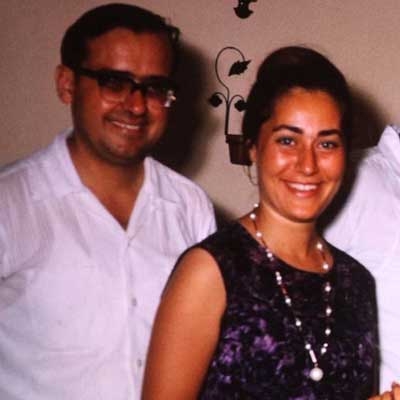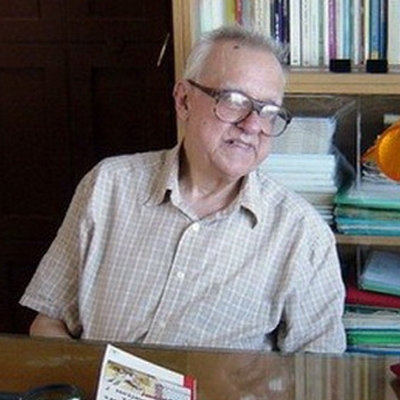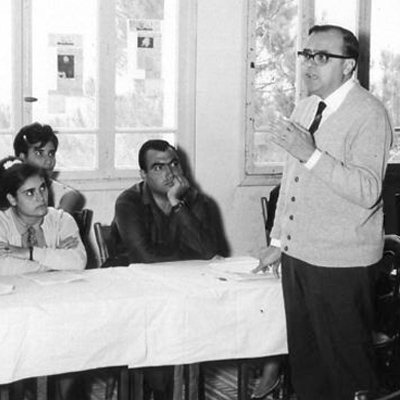
Costy Bendaly (22.08.1926-12.12.2013)
Costi Bendaly was born in El-Mina, Tripoli, Lebanon on 21st August 1926. He passed away on the 12th December 2013. His family comprised, in addition to his mother Theodorah Boulos and his father Iskandar, two sisters: Dr Esperance Bendaly Khlat and Dr Gloria Bendaly Nahhas, two brothers: Metropolitan Boulos (Akkar) and Dr Marcel. He married Mrs Cathy Drouby in 1961. He has three sons: Iskandar, Ghassan, and Dia, and seven grandchildren: Nour, Tarek, Costi, Farah, Fadi, Ghadi and Thea.
He completed his secondary education at the College des Freres School in Tripoli at the young age of fifteen. In 1942, immediately after finishing secondary education, he started to teach because of the early passing away of his father. He took on the responsiblity of the family in the middle of very harsh economic conditions. The people of the city knew a very patient and faithful mother, a widely educated and wise lady who had a deep effect on educating her children, and raising them on profound faith and social values thus pushing them to further their education until they attained the highest academic levels.
At a later stage in his life, Costi pursued his university education in Lyon, France, where he obtained a diploma in Applied Psychology (1960). In 1981 he received his Ph.D. in Philosophy from the University of Lyon.
Costi was a secondary school teacher in the Municipal Stadium State School in Tripoli, in the National Orthodox College – St Elias in El-Mina, and in the Sacred Hearts school. He also taught Psychology at the Lebanese University (1962 – 1964), and in the Ecole Des Lettres in Beirut (1962 – 1969). He lectured in many educational, social and church events.
He practised psychological and educational counselling through many contacts with the youths, individually and collectively, through his state school teaching as well as the Orthodox Youth Movement. He also practised parental guidance through educating parents in his symposiums that were organised by private schools in Tripoli as well as through personal consultations.
Costi wrote over sixty books on religion, philosophy, psychology, education. Many of his books have been adopted in University and Secondary school curricula in Lebanon and Arab Countries.

Costi’s thought journey left its marks in the Arabic East. Daringly it linked the Christian faith, with most aspects of contemporary human thoughts. Costi was characterised both by his encyclopeadical thinking with respect to the sheer volume of his work, and with his scientific accuracy when tackling details. He approached Philosophy, Education, Psychology, Literature, Sociology, building bridges between these disciplines and the faith in Christ by way of very interesting dialogues. Dialogue, in Costi’s approach, is self-criticism in the first place. It is the readiness in being enlightened by what is revealed in the extraneous education. Consequently it is the preparation to prune, reform, and renovate:
<< This is the suffering of religiousness. It is eternally polarised between the symbol and the legend, belief and witchcraft. Therefore religiousness needs to always be submitted to perpetual purification so that it is straightened and purged of anomalies. It needs to accept, with full consent, the criticism that is carried out by those who are external, even if it is exagerated, because, when they oppose its deviations, they help in the rectification of the path and, whether they know it or not, whether they mean it or not, they help it achieve repentance (in the biblical sense of this word – which means change of mentality and inverse of concepts). This must be exercised regularly if religiousness wants to remain genuine>> (Religiousness Between Faith and Witchcraft, Contemplations on the „Dayem, Dayem“ novel of Maroun Abboud, Al Nour Magazine No. 6 and 7, 1981, p.171.
There is no doubt that Costi demanded the same approach, i.e. self-criticism, from the contemporary culture in its dialogue with christianity, pointing out for example the reductionism in Freud’s attitude towards religion, or in the attitude of atheist philosophy toward the human being. This critical standoff doesn’t stop him - the Christian Orthodox who believes that Christ is the fullness of truth - to understand himself as <<a seeker of truth until the last moment of his life>>. This cannot be explained but from the perspective that real dialogue, in his opinion, is a process of a huge amount of scientific seriousness and humbleness.
We find Costi a specialist in Applied Analytical Psychology and education, not only through teaching this discipline at the Lebanese University, but also via the outstanding knowledge achievement embodied in his PhD thesis that he defended in 1981 at Lyon University. In this thesis Costi establishes a new foundation for the dialogue between Freudism and Christianity. He clarifies how the true religion is rooted in maternal and paternal experiences, and how it exceeds it at the same time. These experiences take on the energy of the symbol that reveals and mystifies at the same time.
On top of sciences of psychology and education, Costi was a shcolar of modern philosophy from Nietsche (1844 – 1900) to Paul Ricoeur (1913 – 2005). This is witnessed by his referencing of the modern philosophers and innovative thinkers in order to evolve his theory of “symbolism” in the birth of religion. It is based on elements that are drawn from Freudian psychology and exceed it at once. Also he drew from his flexible dialogue of modern atheism in its Freudian and Marxist shapes. In that, he is a tireless pursuer of old and new literature works, feeding of it what sustains his analysis of psychological and sociological aspects. This is because he is convinced that writers have picked up, with their perceptive sense, a lot of the motions of the human soul and its apparent and hidden inclinations.
We therefore find Costi tackling philosophically the issue of God’s existence. We also see him tackle, with the perspective of the believing scientist, very sensitive theological issues such as the existence of evil in the universe. He takes on the sociological aspects of faith such as justice and non-violence. He establishes a genuine Christian education. He values sex that stems from genuine love and employs it as an experience that serves the human openness to the other. He dismantles sectarianism, exposes the male chauvinism that is rife in our societies. Add to that his tackling of many educational subjects starting from taking care of the personality of the child as well as the young adult. He seeks to deal with these personalities from different angles ensuring an education which goal is to free the human being in a true embrace between faith and life and in which the religious and human aspects go hand in hand.
Costi tackled these titles with a deeply biblical approach and with the fundamental goal of <<embrace between faith and life>>. Since he believed in the centrality of the incarnation of the son of God in this world, loved His presence in His creation, understood that this presence is unlimited. He considered that it is a must for Christians to take care of every human issue. He based his belief on that the Christian faith has to be involved in a dialogue with the different aspects of human culture, so that it has a word to say in today’s world, using a wide knowledge of the other and applying himself to the study of the other and respect him and acknowledge his otherness and admitting his achievements. For Costi, the Christians are the apostles of the divine presence. They are required to expand this presence in the universe with no limits but the limits of the dogma. Therefore, in some of his researches, Costi shook some established faith and social traditions. Some considered these traditions as an integral part of the heritage. He refused to disfigure the heritage of the church by miming it with social and historical inherited traditions or by mixing it with legends: “The death of Christ and His resurrection are the separation between faith and witchcraft, between symbol and legend.”
It's worth to notice in all this, the spreading of the thinking of Bendaly especially in exposing sectarianism and the evils of the consumerist society, the marginalization of women in the eastern, non-orthodox and non-christian milieus, all of this within a creative and critical mechanism which points to the originality of the cultural dimension that his thinking carries.

In his youth, Costi met Archbishop George Khodr one of the main founders of the Orthodox Youth Movement in the College des Freres where they both studied. Khodr convinced him to join the OYM in the beginning of 1944, when Bendaly was eighteen. Afterwards they had a strong and family friendship and deep dialogues focused on the thinking of the OYM and all the hopes that are pinned on the OYM to establish the renaissance of the Orthodox church. Bendaly contributed in establishing the OYM thinking and spreading it especially in Tripoli and Koura (North Lebanon).
In 1945 Metropolitan Khodr (Maitre Khodr back then and the general secretary of the OYM), tasked him with supervising the guidance work in the Tripoli OYM center.
Therefore he established the Sunday Schools in Tripoli and Koura. He expressed the goal of establishing the religious education of children with the following words: “There was a fundamental principle at the heart of our educational path: The embrace of faith and life. We expressed this principle by confirming that the religious education has to be rooted in a humanitarian global education, meaning that the goal of awakening the faith and developing it in a child cannot be separate from helping him to build a fully integrated human persona, refreshed, open, free, confident and daring. This is what pushed us to always twin our knowledge of the faith - to transfer it to children without disfiguration - and our knowledge of the psychology of the child, its fundamental constituents, its phases of development, the crisis that accompany this development, and the obstacles that oppose it” (Back to the origins, thoughts on the sixtieth anniversary of founding the Sunday Schools 11/02/2005)
The aspects of OYM commitment took the largest part of his life. He gained a prominent cultural and leadership place in the OYM and its members. This was because of his passion of the bible, his distinguished education and his intellectual courage, his openness on the youth and their worries, and on the church and its problems. For over half a century, he was the inspirer of the OYM witness, giving it directions on many levels. He was the interlocutor of the youth in the OYM and their guide in many thorny issues. He had a lead role in encouraging the youth to engage in the civil society affairs, the commitment to justice on earth, relying on non-violent struggle to change the society. Apart from a massive intellect, his life credibility, his righteousness, his humbleness, his openness, his commitment to the issues of the poor and the simples, formed the main source of his impact on society and on those who knew him and became his students.
Contributors to this text:
Mr. Rene Antoun – General Secretary of the Orthodox Youth Movement
Professor Assaad Elias Kattan - Chair of Orthodox Theology - Centre for Religious Studies - University of Muenster - Germany
Mr. Iskandar Costi Bendaly
*Translated into English by Mr. Najib Mitri Coutya